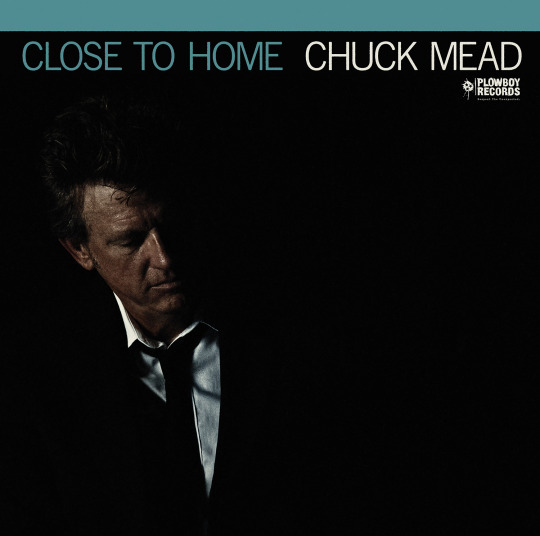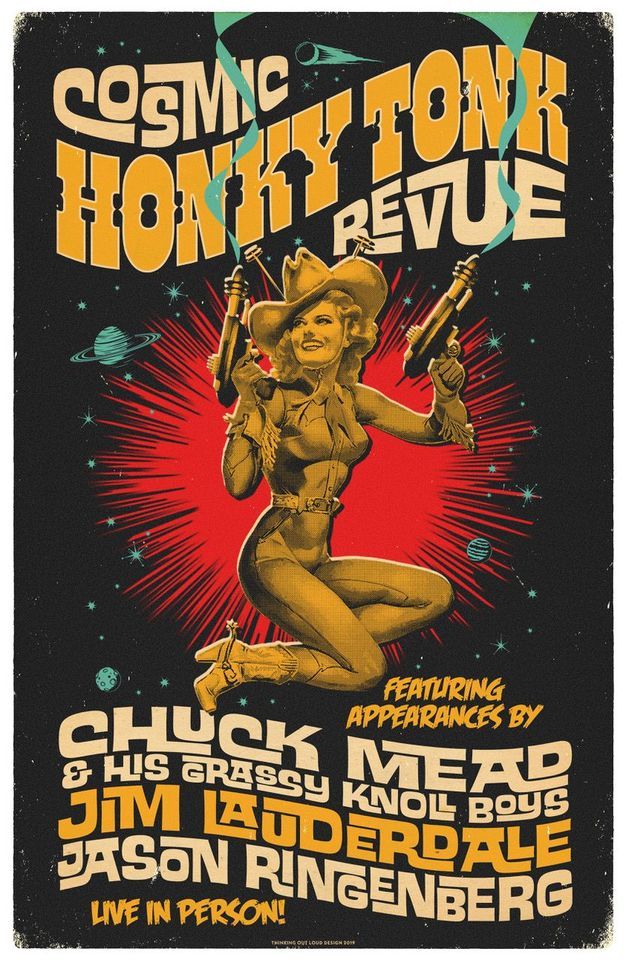#cosmic honky-tonk revue
Text
Chuck Mead Interview: Hit It, Get It, and Quit It

BY JORDAN MAINZER
Context isn’t everything, but it can often shape the mood of a record. Such is the case with Close To Home, the new one from Nashville-based Americana artist Chuck Mead. Recorded in the legendary Sam Phillips Recording studio in Memphis and produced by Matt Ross-Spang, Close To Home is a record of true stories and legends, featuring with some Memphis stalwarts, exemplary of the loose expansiveness of the Home of the Blues as opposed to the concision of Music City, laden with Mead’s quintessential sense of humor and just enough sincerity to evade corniness.
On Close To Home, there are songs of devotion that tackle both moods: For instance, “My Baby’s Holding It Down”, Mead’s sweet tribute to his wife who looks after his home when he’s on tour, is a non-traditional juxtaposition with a song like “Daddy Worked The Pole”. That one’s about a man who got a job hanging telephone wire so his wife wouldn’t have to work the kind of pole that normally comes to mind--until she started stripping so he didn’t have to work. “Billy Doesn’t Know He’s Bad” and “There’s Love Where I Come From” occupy two sides of the same coin, the former an exasperated look at a sociopathic outlaw and the latter an ode to inclusiveness, both songs in it for the good guys. The distorted country rock of “Big Bear in the Sky” references Native American lore; the title track tackles the eerie prescience of songs on the radio. But as serious as Mead gets, he’s also having loads of fun, with the bayou grooves of “Shake”, barroom piano of “Tap Into Your Misery”, and reggae blues of “I’m Not The Man For The Job”. Perhaps the most ramshackle is the old-school hillbilly burner “Better Than I Was (When I Wasn’t So Good)”, which ends with a snippet of the recording of the song itself. “Did that sound drunk enough?” asks bassist Mark Andrew Miller with an appropriate drawl.
I spoke to Mead over the phone last week about Close To Home, and my main takeaway was that his personality was reminiscent of the album itself. Friendly, engaged, unafraid to tell me when I was wrong about the record, and possessing of a penchant for quotes, quotables, and non-sequitir, Mead was a delight to talk to. He’s coming to City Winery on Thursday for The Cosmic Honky-Tonk Revue, a co-headlining tour with Jim Lauderdale and Jason Ringenberg, all backed by his band, the Grassy Knoll Boys. Read the interview below, edited for length and clarity.
Since I Left You: What about Close to Home is unique to you as compared to your previous records?
Chuck Mead: The lion’s share of what I record is in Nashville, so going to Memphis to do it is a departure. To put yourself in a different place--and there were a couple of songs we had been playing for a little while that took on a different dimension just because of where we were and the studio we were in, the Sam Phillips Recording studio he built in 1962 when he left Sun [Records] and had enough money to do what he wanted to do. My buddy Matt Ross-Spang is a great producer and is the manager for the place now doing a lot of great work. Just tapping into the spirit of Sam Phillips, where anything can happen.
SILY: The title of the record is taken from the idea of songs that “hit close to home.” Were you playing with the idea that home is not as much a concrete place as it is a feeling?
CM: Yeah, I guess you could say that. You’re always close to home. Home is where the heart is...on the bus! Sorry, that’s a Frank Zappa quote. But it’s true, nonetheless. I think you hit on something. But that particular song [the title track] is about how some weird song on the radio explains exactly what you’re going through. How does that happen? Man. That thing you said last week that came true. It makes it seems like there’s some order in the universe when probably there’s not. It seems like it happens a lot. I don’t want to get too spacey or hippie-dippie about it.
SILY: You mentioned working with Matt. How did the record have a different instrumental vibe than your previous ones?
CM: We never had someone coming into play like during this one. Don Herron who used to be in BR549 played some fiddle. Critter Fuqua from Old Crow Medicine Show came in and played accordion. It was still very Nashville-centric, but because we were in Memphis, we got Rick Steff to play the keyboards. John Paul Keith came in and played guitar. It lent more of a local flavor to it. It led to a slightly different vibe, which is great. Doing the same thing every time would be pretty boring, don’t you think?
SILY: And the album within itself has a nice variation--speaking of which, how did you decide upon the sequencing?
CM: You know, I don’t know. I just went through different sequences the songs were in, and it just seemed to flow the best the way it came out. It’s not like we were trying to tell a long story or anything. The songs seem to go together even though there’s a lot of different kind of things on it, and I guess that’s just because it’s us.
SILY: I want to ask you about a few specific tracks. First up: Is “Big Bear in the Sky” literally about stargazing?
CM: Well, no, it’s about that particular constellation. Many different cultures have a legend that they put a bear up there in the constellation. This particular story is an Indian legend from up in Canada. Originally, the song was for the Bear Family label out of Germany. [Founder Richard Wieze] asked me to write a bear song for their 40th anniversary.
SILY: I like the juxtaposition in the track “My Baby’s Holding It Down” between “holding it down” and “holding me down.” What’s the difference to you?
CM: Well, she never holds me down. She’s holding it down because I’m not there. But she’s not holding me down at all--though she could probably kick my ass. People who travel a lot, the people at home have to take care of stuff. And when you’re home, you have to take over, because they’re holding it down the rest of the time. She’s also probably holding down her anger. [laughs] But not really. People suck it up and they get through life. That’s just kind of what that song’s about. She doesn’t need me around. I guess I’m kind of nice to have around sometimes.
SILY: It’s about your wife, presumably?
CM: Yeah. I wrote it with my friend Paul Cebar, who also travels a lot and has been married about as long as I have. But you can write only so intimate a song. It’s general. It’s a tribute to significant others who hold it down a lot.
SILY: In the song “Better Than I Was (When I Wasn’t So Good)”, at the end, when you say, “Did that sound drunk enough at the end?”--
CM: That was Mark Andrew Miller who said that. [laughs, then imitates] “Did that sound drunk enough?”
SILY: Was that the type of thing you simply left in because it was so funny?
CM: Well, yeah. When we got the rough mix of it back, and that was in there, we thought, “Well, that’s gotta stay.”
SILY: Let’s talk about “Billy Doesn’t Know He’s Bad”. In so much of traditional music, you have murder ballads where the murderer has a clear intention and a lot of agency, and here, it’s a song where you have a lot of empathy for this murderous outlaw who doesn’t know why he’s doing the things he’s doing.
CM: No, I don’t have a lot of empathy. It’s a comment on sociopathic people. They think everybody thinks exactly like them, but they don’t care. They don’t know they’re being bad. They don’t know they’re assholes. I’m not excusing anything. Billy was an asshole. He lit up his neighbor’s house for no reason! It was a comment on someone like Jesse James or Billy The Kid who were kind of glorified for the way they lived their lives. Jesse James robbed and killed people. He’s a sociopath. You try to be understanding of it. When I wrote that song--Logan Ledger and I wrote that song--it seemed like it needed something. Mark Miller said, “Hey man, I think I have a good bridge for that.” So he comes up with that middle part that takes it to a whole new level of people trying to understand the way they are, nature, and nurture. It really ties it all together. I was really happy to have that happen. It’s kind of different. Those songs aren’t usually about that. It’s usually about a guy who kills his girlfriend because she’s pregnant or something.
SILY: Do you think the instrumentation of that song was an intentional contrast to how you’re viewing the character and subject matter?
CM: No, that was just kind of the way it came out. We went through it a bunch of times. I guess Rick added a Mellotron on that song to make it more dramatic, which helped out the bridge. In that sense, I guess you’re right. But it was one of those things that evolved in the studio. When we were originally working it out, it was just us four. That’s the thing that can happen in Memphis that doesn’t always happen here in Nashville, though that’s less true as time goes on. A lot of people own their own studios and cut their records so they can take as much time as they want. I don’t have that luxury. Usually, you just go into a studio and bang it out because everybody’s so damn good. In Memphis, you like to kick it around a little bit. That’s why we were able to chase that one around the room a little while.

SILY: What’s the inspiration behind the cover art of the record?
CM: I’ve been working with Jim Herrington for a long time. He’s my best friend. He’s done all of my solo records. He did the first couple of BR549 records, too. He’s photographed tons of great people over the years, and he and I have this consistency of getting something slightly noir that doesn’t look like your average album cover. Probably one of my favorite things someone said--there was a review of the record where the guy didn’t know anything about country or Americana but was drawn to the record because he thought it looked like Bryan Ferry. He liked the record, and he said, “It’s the most curious record you’ll hear all year.” For him, I guess. I don’t seem so curious. But it’s a tribute to the mysteriousness of Jim Herrington’s photo.
SILY: How are you adapting these new songs to the stage?
CM: Just goin’ out there and playin’ ‘em. [laughs] We’ve been playin’ ‘em over in Europe. Just bangin’ it out. We really did it pretty much live right there in the studio. More than a few songs, that was the vocal I was singing while we were cutting. Of course, we did overdubs where necessary, but there’s a certain liveness you want [in order] to capture the spirit of what’s going down. But when you start playing them after a while they do take on a certain dimension?
SILY: Extending a part or jamming.
CM: We don’t do too much of that. Sometimes, we’ll cut loose. We’re not a jam band to play a song for 30 minutes, although there’s nothing wrong with that. But I like to hit it, get it, and quit it.
SILY: Anything you’ve been listening to, watching, or reading lately that’s caught your attention?
CM: I’m reading a Lightning Hopkins biography right now. That guy recorded a lot of songs. [laughs] He’s one of my favorites though. I just finished this novel called Country Dark that was pretty damn good, about people up in Kentucky. Listening--I’ve mostly been listening to a lot of Jim Lauderdale and Jason Ringenberg. Gettin’ ready for the tour. We all have records out. Of course I like Margo Price’s record.
Album score: 7.1/10
youtube
#chuck mead#interviews#album review#live picks#live preview#matt ross-spang#mark andrew miller#city winery#jim lauderdale#jason ringenberg#rick steff#john paul keith#paul cebar#logan ledger#jim herrington#hit it get it and quit it#close to home#sam phillips#sam phillips recording#home of the blues#music city#cosmic honky-tonk revue#grassy knoll boys#sun records#frank zappa#don herron#br549#critter fuqua#old crow medicine show#bear family
0 notes
Photo

Cosmic Honky Tonk Revue with Jason Ringenberg, Jim Lauderdale, Chuck Mead Coming To Southgate House Revival On 7/28 http://www.cincygroove.com/?p=86633
0 notes
Text
Cosmic American Music: Chuck Mead, Jason Ringenberg & Jim Lauderdale's Excellent Adventure
Cosmic American Music: Chuck Mead, Jason Ringenberg & Jim Lauderdale's Excellent Adventure @jimlauderdale1 @chuckmead22 @swosahla @buddyandjim @jasonringenberg @thehamiltondc #americanamusic
“You’ve heard of the three tenors,” Jim Lauderdale said to the audience gathered at the Hamilton in Washington, D.C. “Well this is the Cosmic Honky Tonk Revue.”
There was no resemblance in pitch or look to Luciano Pavarotti, Jose Carreras and Placido Domingo. Jim Lauderdale was referring to himself and friends Chuck Mead and Jason Ringenberg who landed with Mead’s Grassy Knolls Boys in the…
View On WordPress
0 notes